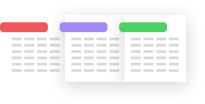In today’s rapidly evolving academic landscape, it’s crucial for educational institutions to manage their operations, data, and resources effectively. The multitude of challenges faced while managing these aspects calls for a robust solution; one of them is a Higher Education ERP. Opting for a reliable education ERP system streamlines administrative processes, enriches data management, and enhances communication within the institution, ultimately catering to better educational experiences. However, selecting an ERP for such purposes is a challenging task to deal with. It requires meticulously evaluating various crucial elements to ensure the chosen system aligns with the institution’s unique needs and goals. In this blog, we will look into the significant factors that educational institutions must consider when making this critical decision, as the implications of their choice can reverberate throughout the institution for years to come.
Understanding Higher Education ERP
ERP for higher education is a system that integrates various institutions’ functions and processes into a single, unified platform. When it comes to higher education, Enterprise Resource Planning (ERP) software serves as a comprehensive solution to manage academic, administrative, and financial tasks, all under one digital roof. The education ERP software allows us to record information about students, admissions, course scheduling, financial aid, and many more.
Importance Of ERP In Modern Educational Institutions
Higher education ERP software empowers educational institutions to manage an array of functions seamlessly. Implementing ERP effectively results in,
- – Streamlined administrative and academic processes
- – Centralized overall institutional data
- – Improved efficiency
- – Enhanced data accuracy
- – Improved communication
- – Enables data-driven decisions
- – Ability to remodel to changing circumstances
- – Provides a better overall experience to institutions, faculty, and students
- – Helps to meet the digital age demands and remain competitive in the evolving educational landscape
The real-time access to information offered by the education ERP system is advantageous in simplifying every task, which is invaluable for administrators, faculty, and students alike.
Significance Of Centralized Information Management
The important key feature of ERP for higher education is the centralized management of information. A centralized information management system reduces data redundancy, offers consistent and cohesive data structure, and enhances data security. Similarly, it ensures that specific information is accessible to individuals who need it, ultimately promoting data integrity.
Centralized information management allows more effective and coordinated handling of various aspects, resulting in better institutional performance and decision-making.
Factors To Consider While Choosing Higher Education ERP
- Institutional Needs Assessment
The primary step while selecting the right ERP for higher education is understanding the needs of an institution that aligns with its mission and goals. Every educational institution has unique requirements, and the ERP should cater to these distinct requirements efficiently. Considering faculty, staff, and administrators, it is essential to identify the needs and sections that require improvement. Whether enrollment management, academic services, or financial management, a thorough needs assessment is the foundation for ERP implementation success.
- Scalability and Flexibility
The field of education undergoes changes with time; hence, the education ERP system should be capable of scaling accordingly. Scalability ensures that the ERP software remains relevant and adaptable in the long term. Similarly, the education ERP software should be flexible to adapt to the changing needs and emerging trends. It should be easy to customize to meet the unique requirements and also allow the integration of new features and modules.
- User-Friendly Interface
The effectiveness of the ERP for higher education depends on how uncomplicated the interface is for users to interact. Hence, a user-friendly interface is essential as it will help faculty, students, and staff utilize it without needing extensive training. Intuitive navigation, responsive design, and accessible dashboards are vital aspects that enhance user experience and ensure widespread adoption.
- Mobile Accessibility
In the digital age, accessing information anytime, anywhere, is paramount. Institutions should consider ERP’s compatibility with mobile devices to access it whenever necessary. This feature is also crucial for remote learning and administration. ERP education providers like Classe365 offer mobile accessibility, allowing users to perform various functions, access data, learn, and communicate from mobile devices.
- Data Security and Compliance
Higher education institutions handle extensive amounts of sensitive data, including students’ information, financial records, and many more. Thus, data security is a serious concern. While selecting an education ERP software, institutions should prioritize solutions that comply with stringent security standards and regulatory compliance. Ensure that the software offers features for managing sensitive data securely and offers access control and audit trails for data security.
- Cost and Budget Considerations
Budget is one of the concerns for most educational institutions. For this, educational institutions should develop a comprehensive budget that includes initial costs, ongoing expenses, and potential upgrades. Institutions should also weigh the long-term benefits of investment and the potential returns. While institutions are considering ERP implementation, consider exploring pricing models, such as subscriptions or one-time licensing. Classe365 offers a customizable modular solution which allows institutions of all sizes to adapt the platform based on their needs and usage.
- User Training and Adoption
Maximum adoption by users makes the ERP implementation more successful. Ensure that the ERP vendor provides adequate support during implementation. For a smoother transition, plan for staff and faculty training programs. This keeps the faculty, staff, and students well-informed and comfortable with the system.
Considering the abovementioned factors, selecting a reliable higher education ERP for educational institutions becomes easier. Searching for an integrated platform that handles all your institutional needs under one roof? Classe365 is a trusted partner of 6300+ education institutions that offers a comprehensive solution to manage the entire student lifecycle in one place. Renowned for an array of tailored features and a user-friendly interface, the higher education ERP platform offered by Classe365 is preferred by top institutions worldwide.
Get ready to metamorphose into the dynamic world of Higher Education ERP with Classe365! Book a demo with us today and determine how swiftly you can overcome higher education management challenges and lead a streamlined path.













